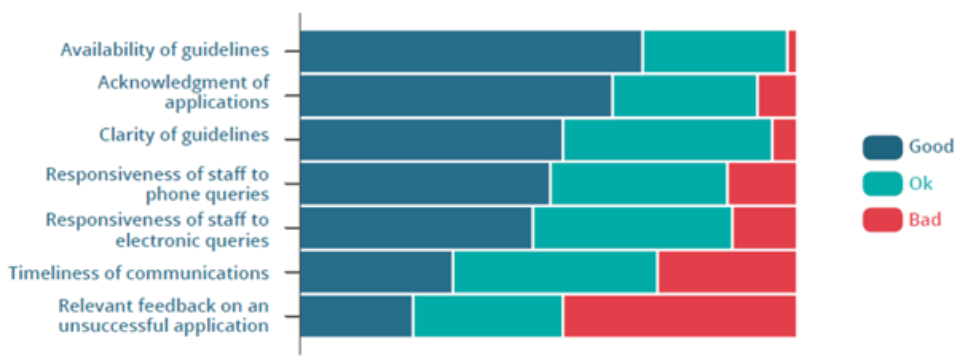Feedback is one thing grantmakers must do better
Posted on 17 Nov 2021

Grantmakers still suck when it comes to giving good feedback and it’s the number one thing they should do to improve their grantmaking, says SmartyGrants leader and self-confessed “grants nerd” Kathy Richardson.
Our Community’s executive director recently addressed a group of Queensland grantmakers for a grants muster at Dalby, in the cotton- and rice-growing heartland of the state’s Western Downs district.
Ms Richardson said grantmakers could make an immediate impact on their programs by improving feedback to applicants.

Citing the SmartyGrants Grants in Australia research series, comprising 10 studies since 2006, Ms Richardson said a survey of more than 2000 grantseekers in the most recent study showed only 23% thought feedback about unsuccessful applications was good.
And worse, 47% of respondents described the amount of feedback as “bad”.
Since 2006, there has been a slow improvement in the level of feedback. Back then feedback levels were diabolical, with just 2% of respondents describing feedback as “excellent” and just 17% saying it was “okay”.

“After years of taking the pulse on this issue, we see that grantseekers still highlight this as a pain point,” Ms Richardson said.
She said grantseekers wanted and needed more useful and relevant information about unsuccessful applications.
She gave the following examples of responses from grantseekers:
- "After completing a really detailed grant application the only acknowledgement we have ever received was a generic postcard stating that the (application) had been received. The next thing we hear is another generic letter stating that we have been unsuccessful."
- "Feedback about unsuccessful grants is not really truthful. There are formula sentences they hide behind to justify not giving the money, rather than actually being useful to the applicant for future applications."
- "On several occasions my volunteer colleagues and I have spent many hours working on applications where we are certain that our project nicely fits the criteria, only to be unsuccessful – to then receive no feedback other than 'sorry, we receive a lot of applications' is extremely disappointing and frustrating."

Ms Richardson said she understood the difficulties from the point of view of grantmakers, especially in circumstances like these:
- When everything about the application was wrong
- When the truth could be “dangerous” to reveal, such as where a minister/councillor would get more “airplay” from one application than another
- Where the reasons for rejection were hard to tease out, e.g. “we just liked that one more”.
But she said that for grantmakers it was never true to say, “There was simply not enough money to go around.” She argued that there was always a reason for the success of one application and not another, and that it possible to articulate that reason and to pass it on to grantseekers.
She said grantmakers should review feedback templates, and ruthlessly remove “hollow statements and weasel words”.
And she said that funders must budget resources for providing feedback and offer one-on-one debriefs if possible.
Ms Richardson said good feedback could ease the pain of rejection.
“Feedback is the only way you have of thanking grantseekers for the days of unpaid work they put into fruitless exertions.”
And she stressed that the feedback process created a major benefit for funders.
“In the evolutionary scheme of things, your successes are built on the work of the submissions that were rejected as much as on the ones that were funded.”
She said good feedback was likely to improve the quality of future applications, and that grantmakers’ feedback should include an opportunity for grantseekers to provide their own comments about potential program improvements.